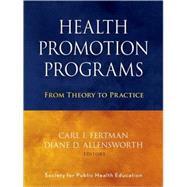Health Promotion Programs introduces the theory of health promotion and presents an overview of current best practices from a wide variety of settings that include schools, health care organizations, workplace, and community. The 43 contributors to Health Promotion Programs focus on students and professionals interested in planning, implementing, and evaluating programs that promote health equity. In addition to the focus on best practices, each chapter contains information on:
-Identifying health promotion programs
-Eliminating health disparities
-Defining and applying health promotion theories and models
-Assessing the needs of program participants
-Creating and supporting evidence-based programs
-Implementing health promotion programs: Tools, program staff, and budgets
-Advocacy
-Communicating health information effectively
-Developing and increasing program funding
-Evaluating, improving, and sustaining health promotion programs
-Health promotion challenges and opportunities
-Health promotion resources and career links
"The authors have clearly connected the dots among planning, theory, evaluation, health disparity, and advocacy, and have created a user-friendly toolbox for health promotion empowerment." -Ronald L. Braithwaite, PhD, professor, Morehouse School of Medicine, Departments of Community Health and Preventive Medicine, Family Medicine, and Psychiatry
"The most comprehensive program planning text to date, this book examines all facets of planning and implementation across four key work environments where health educators function." -Mal Goldsmith, PhD, CHES, professor and coordinator of Health Education, Southern Illinois University, Edwardsville
"Health Promotion Programs . . . . explores the thinking of some of our field's leaders and confirms its well-deserved place in the field and in our personal collections." -Susan M. Radius, PhD, CHES, professor and program director, Health Science Department, Towson University








